Health
Merck Empowers Ugandan Infertile Women
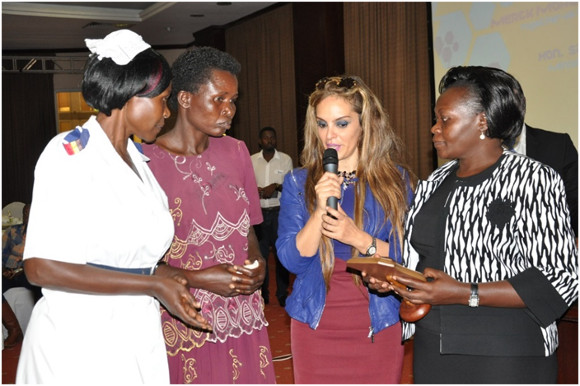
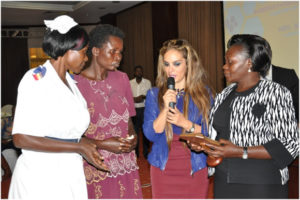
By Modupe Gbadeyanka
Leading science and technology company, Merck, today continues their commitment for the second year to empower infertile women in Uganda through improving access to information, health, change of mind-set and economic empowerment.
Through ‘Empowering Berna’, Merck in partnership with Uganda Ministry of Health inaugurates today small businesses that been established this year to support infertile women across the country.
The day’s program also included a courtesy visit to Uganda’s First Lady H.E. Janet Museveni at State House, Kampala by the Merck delegation to brief her on the ‘Merck More than a Mother’ initiative and to explore possible areas of collaboration. The delegation consisted of H.E. Madame Brigitte Touadera, First Lady, Central African Republic; Sarah Opendi, Minister of State for Health, Uganda; Belen Garijo, CEO, Merck Healthcare; Virginie Baiokua, Minister of Social Affairs and National Reconciliation, Central African Republic; Zuliatu Cooper, Deputy Minister of Health and Sanitation, Sierra Leone; Joyce Lay, Member of Parliament, Kenya; Dr. Rasha Kelej, Chief Social Officer, Merck Healthcare; and Lina Ekomo, Central African Republic.
Speaking at the event, Belén Garijo, Member of Executive Board and CEO of Merck Healthcare emphasized: “I believe in women empowerment and especially childless women – they are mistreated and discriminated in many cultures for being unable to have children and start a family. Empowering these women through access to information, health, and change of mind set to remove the stigma of infertility is needed. Through ‘Merck More than a Mother’ we are supporting this strong message together with our partners and we will continue our commitment to improve access to regulated and effective fertility care in Africa.”
“In Africa including Uganda, infertile women still suffer discrimination, stigma and ostracism. More often an inability to have a child or to become pregnant results in the woman being greatly isolated, disinherited or assaulted. This sometimes also results in divorce or physical and psychological violence. I am glad to see an initiative that addresses this challenge in the public domain in Africa as it is something that no one talks about and is treated as secret. ‘Merck More than a Mother’ is therefore very important for Africa since it aims to define interventions to reduce the stigma and social suffering of infertile women across the continent,” said, Sarah Opendi, Minister of State of Health, Uganda.
Madame Brigitte Touadera, the First Lady of the Central African Republic (CAR) said: “I am very happy to participate in today’s launch another milestone of ‘Merck More than a Mother’ in Uganda as it follows the one we had for the Central African Republic (CAR) last month and in Kenya yesterday. As the champion for the initiative in CAR and for Francophone Africa, I acknowledge the social suffering infertile women go through and the role that ‘Merck More than a Mother’ is playing to eliminate this suffering and stigmatization by raising awareness about infertility prevention, male infertility and the necessity of a team approach to family building among couples which is very critical for Africa.”
Rasha Kelej, Chief Social Officer, Merck Healthcare explained: “Empowering those women across Ugandan rural villages was very essential, those women suffered great deal of discrimination, violence and isolation. Moreover meeting community members and leaders there to emphasize the importance to change their perception of infertility and infertile women in specific was very productive. I have witnessed firsthand the instant change of their mind-set and the transformation of those vulnerable childless women to strong, proud and productive community members.”
According to the World Health Organization (WHO), lower levels of development are thought to be associated with higher levels of non-genetic and preventable causes of infertility such as poor nutrition, untreated sexually transmitted infections (STIs), unsafe abortion, consequence of infections caused by the practice of female genital mutilation, exposure to smoking and to leaded petrol and other environmental pollutants. Hence prevention awareness is very important,” Sarah Opendi added.
“The businesses established by ‘Empowering Berna’ project are benefitting over 800 women in many districts in Uganda who have come together in groups and have been trained and supported to establish bakery, catering and tent hire businesses and more. They are currently able to earn an income to support themselves from their own new businesses – they are now ‘more than mothers’,” Rasha Kelej added.
Over 1,000 infertile women in Kenya, Uganda, Nigeria, Ghana, Tanzania, CAR, Ethiopia, Liberia and Cote D’Ivoire who can no longer be treated have been empowered socially and economically to lead independent and happier lives through ‘Empowering Berna’.
The event in Uganda was attended by policy makers including ministers and fertility experts and included: Sarah Opendi, Minister of State of Health, Uganda; Zuliatu Cooper, Deputy Minister of Health and Sanitation, Sierra Leone; Virginie Baikoua, Minister of Social Affairs and National Reconciliation, CAR; Joyce Lay, Member of Parliament, Kenya; Oladapo Ashiru, President of Africa Fertility Society; Joe Simpson, Past President, International Federation of Fertility Societies; Paul Le Roux, President of Southern African Society of Reproductive Medicine and Gynaecological Endoscopy; Kamini Rao, Chair International Institute for Training & Research in Reproductive Health, India; and Mohamed Kamal, President of Future Assured Foundation, Nigeria.
Health
Polaris Bank Sponsors Free Breast, Prostate Cancer Screenings
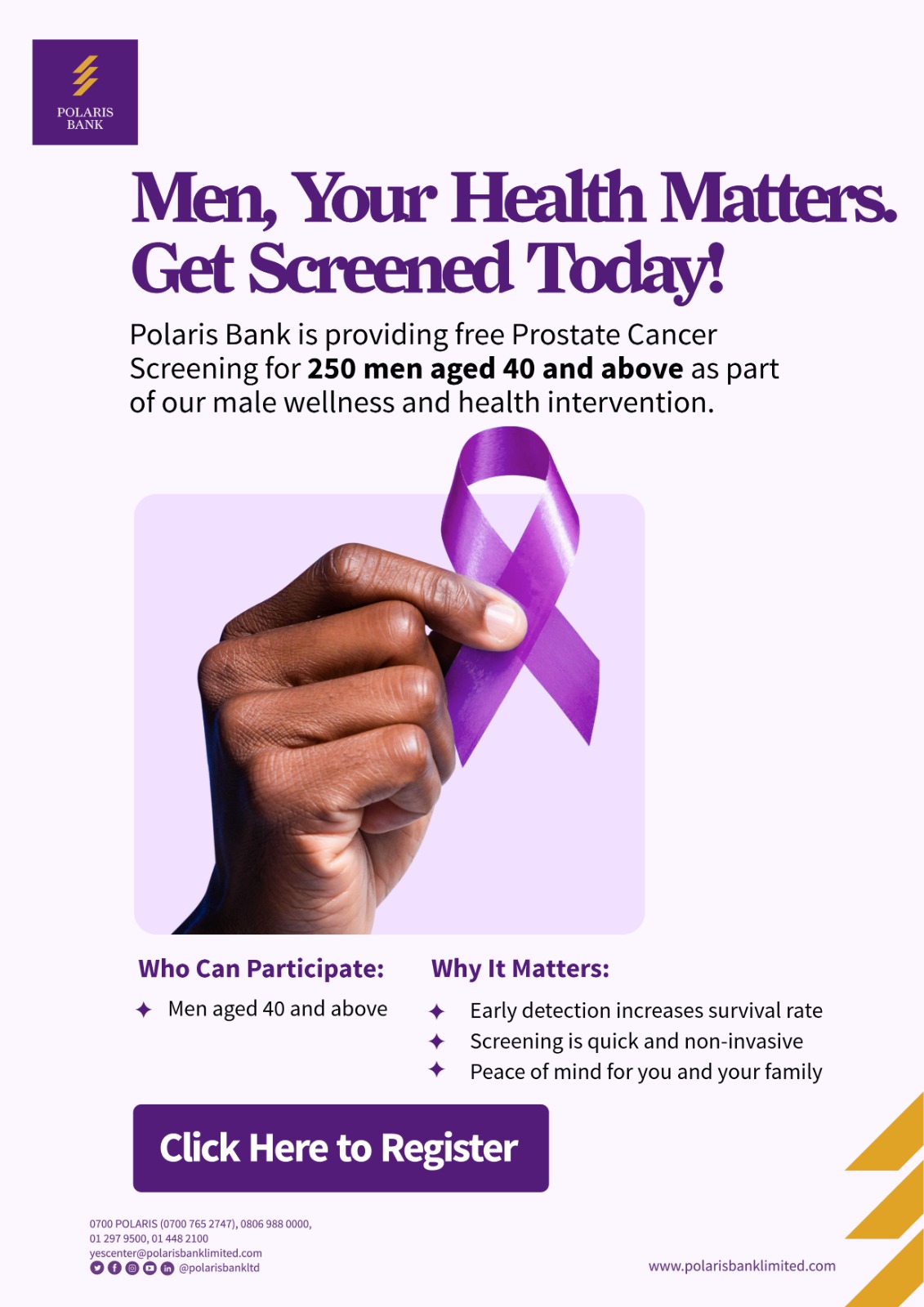
By Modupe Gbadeyanka
To commemorate World Cancer Day observed on Wednesday, February 4, 2026, Polaris Bank Limited is bankrolling free screenings for breast and prostate cancers across the country.
The financial institution partnered with a non-governmental organization (NGO) known as Care Organization and Public Enlightenment (COPE) for this initiative.
At least 100 women would be screened during the exercise, scheduled for Saturday, February 21, 2026, at the C.O.P.E Centre on 39B, Adeniyi Jones Avenue, Ikeja, Lagos, from 10:00 am to 2:00 pm.
The exercise will be conducted by trained health professionals and volunteers, ensuring participants receive both screening services and educational guidance on cancer prevention, self-examination, and follow-up care.
To participate in the free breast cancer screening programme, the applicants must be women, must be Polaris Bank account holders, and must have registered ahead of the day via bit.ly/BCS2026, with selection based on early and confirmed submissions.
Polaris Bank said the initiative was designed to promote awareness, screening, early detection, and preventive care, reinforcing its belief that access to health services is a critical foundation for individual and economic well-being.
The organization is already supporting an on-going free prostate cancer screening programme for 250 men aged 40 years and above across Nigeria.
The prostate cancer screening is being conducted at the Men’s Clinic, situated at 18, Commercial Avenue, Sabo, Yaba, Lagos, providing accessible, professional medical support for male participants seeking early detection and preventive care for prostate cancer.
Both initiatives (free breast and prostate cancer screenings) directly aligns with the United Nations Sustainable Development Goals, particularly SDG 3 (Good Health and Well-being) through improved access to preventive healthcare and early detection services, SDG 5 (Gender Equality) by prioritizing women’s health and empowerment, and SDG 17 (Partnerships for the Goals) through strategic collaboration with civil society organizations such as C.O.P.E to deliver community-centered impact.
Educational materials, community engagement sessions, and digital awareness campaigns will be deployed to reinforce key messages around early detection, lifestyle choices, and the importance of regular medical check-ups.
The Head of Brand Management and Corporate Communications for Polaris Bank, Mr Rasheed Bolarinwa, emphasised that early detection remains one of the most effective tools in the fight against cancer.
Health
NSIA Gets IFC’s Naira-financing to Scale Oncology, Diagnostic Services
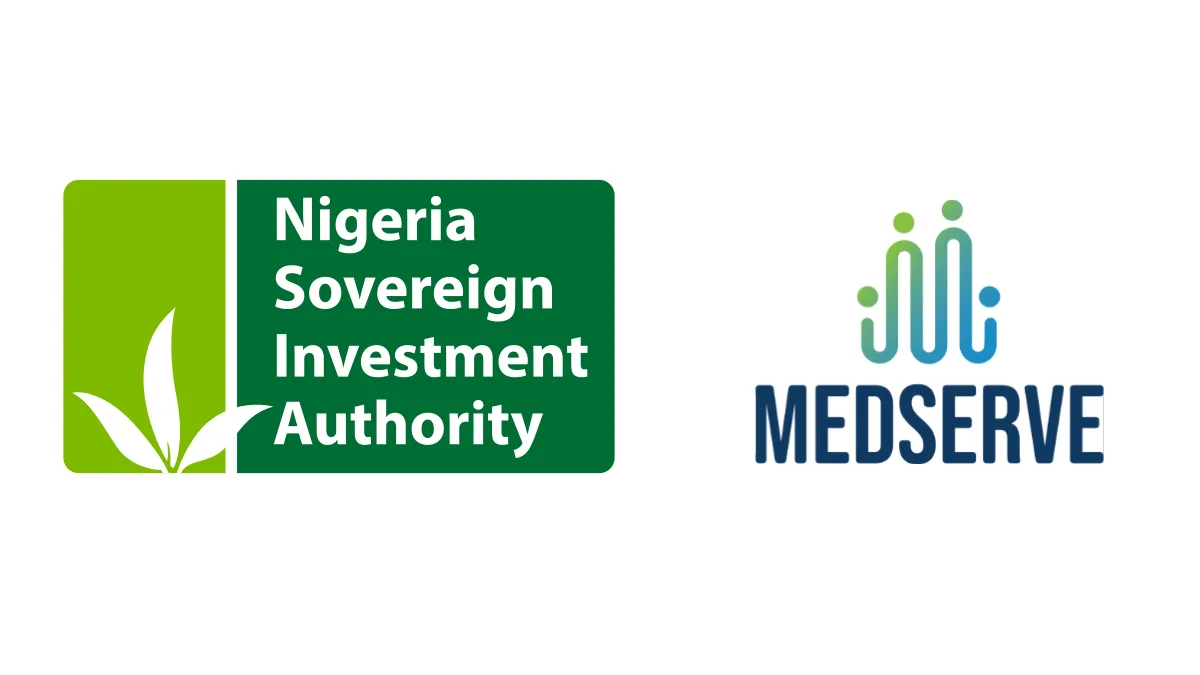
By Adedapo Adesanya
International Finance Corporation (IFC), a subsidiary of the World Bank, and the Nigeria Sovereign Investment Authority (NSIA) have partnered to provide Naira-denominated financing to NSIA Advanced Medical Services Limited (MedServe), a wholly owned healthcare subsidiary of the country’s wealth fund.
Supported by the International Development Association’s Private Sector Window Local Currency Facility, this financing enables MedServe to scale critical healthcare infrastructure while mitigating foreign exchange risks. IFC is a member of the World Bank Group.
The funds will support MedServe’s expansion program to establish diagnostic centers, radiotherapy-enabled cancer care facilities, and cardiac catheterisation laboratories across several Nigerian states.
These centres will feature advanced medical technologies, including CT and MRI imaging, digital pathology labs, linear accelerators, and cardiac catheterisation equipment, thereby enhancing specialised diagnostics and treatment.
MedServe provides sustainable service delivery with pricing that matches local income levels, helping ensure broader access to affordable oncology care for low-income patients.
The initiative will deliver over a dozen modern diagnostic and treatment centers across Nigeria, create 800 direct jobs, and train more than 500 healthcare professionals in oncology and cardiology specialties.
The total project size is $154.1 million, with IFC contributing roughly N14.2 billion ($24.5 million) in long-tenor local currency financing, marking IFC’s first healthcare investment in Nigeria using this structure.
This comes as Nigeria advances its aspirations for Universal Health Coverage. This partnership provides an opportunity to leverage private investment to complement government efforts to expand oncology care and diagnostic services.
IFC’s provision of long-tenor Naira financing addresses a significant market gap and unlocks institutional capital for healthcare infrastructure with strong development upside while MedServe’s co-location strategy with public hospitals maximises capital efficiency and strengthens the public-private ecosystem, establishing a replicable platform for future investment.
“This partnership with IFC represents a significant milestone in NSIA’s commitment to strengthening Nigeria’s healthcare ecosystem through sustainable, locally anchored investment solutions,” said Mr Aminu Umar-Sadiq, managing director & chief executive of NSIA.
He added, “By deploying long-tenor Naira financing, we are addressing critical infrastructure gaps while reducing foreign exchange risk and ensuring that quality diagnostic and cancer care services are accessible to underserved communities. MedServe’s expansion underscores our belief that commercially viable healthcare investments can deliver strong development impact while supporting national health priorities.”
“This ambition is consistent with our broader vision for Africa, one where resilient health systems and inclusive growth reinforce each other to deliver long-term impact across the continent,” said Mr Ethiopis Tafara, IFC Vice President for Africa.
Health
Lagos Steps up Mandatory Health Insurance Drive
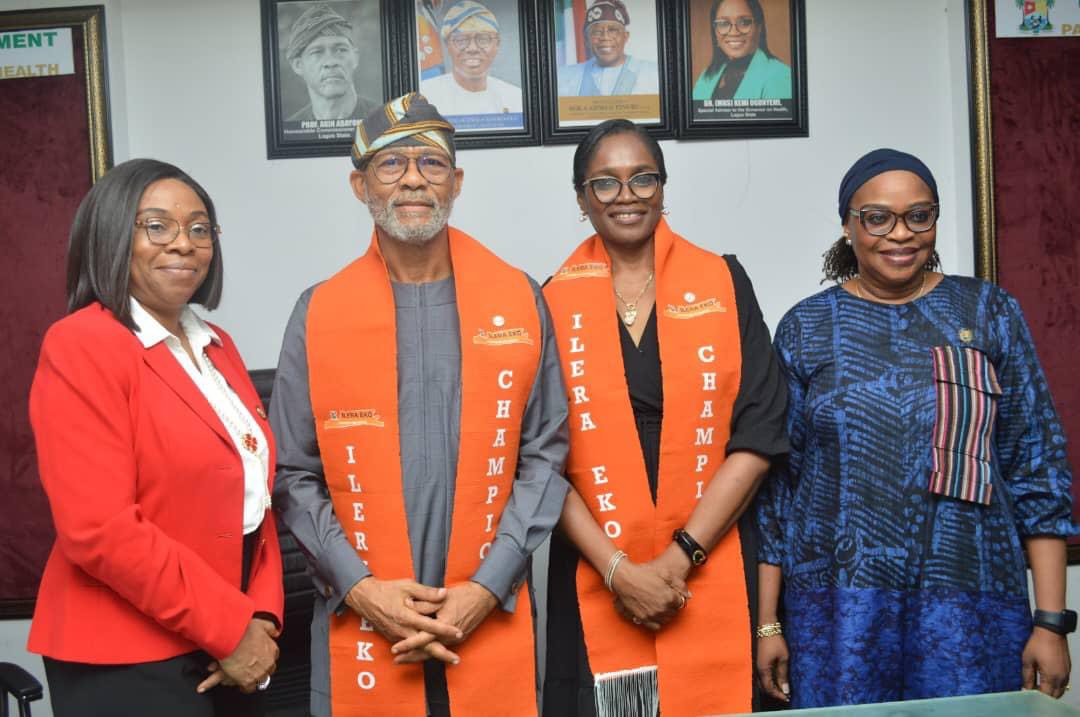
By Modupe Gbadeyanka
Efforts to entrench mandatory health insurance through the Ilera Eko Social Health Insurance Scheme in Lagos State have been stepped by the state government.
This was done with the formal investiture of the Commissioner for Health, Professor Akin Abayomi, and the Special Adviser to the Governor on Health, Mrs Kemi Ogunyemi, as Enforcement Leads of the Lagos State Health Scheme Executive Order and ILERA EKO Champions.
The Commissioner described the recognition as both symbolic and strategic, noting that Lagos is deliberately shifting residents away from out-of-pocket healthcare spending to insurance-based financing.
“We have been battling with how to increase enrolment in ILERA EKO and change the culture of cash payment for healthcare. Insurance is a social safety net, and this mindset shift is non-negotiable,” he said.
He recalled that Lagos became the first state to domesticate the 2022 National Health Insurance Authority (NHIA) Act through an Executive Order issued in July 2024, making health insurance mandatory. He stressed that the decision reflected the Governor’s strong commitment to healthcare financing reform, adding, “When Mr. Governor personally edits and re-edits a document, it shows how critical that issue is to the future of Lagosians.”
Mr Abayomi also warned against stigmatisation of insured patients, describing negative attitudes towards Ilera Eko enrolees as a major barrier to uptake. “If someone presents an Ilera Eko card and is treated as inferior, uptake will suffer. That must stop,” he said, pledging to prioritise insurance compliance during facility inspections. “The key question I will keep asking is: ‘Where is the Ilera Eko?’”
In her remarks, Mrs Ogunyemi, said the enforcement role goes beyond a title, stressing that the health insurance scheme is now law.
“This is about Universal Health Coverage and equitable access to quality healthcare for everyone in Lagos State,” she said, noting that ILERA EKO aligns with the state’s THEMES Plus Agenda.
She commended the Lagos State Health Management Agency (LASHMA) for aggressive sensitisation efforts across the state, saying constant visibility was necessary to address persistent gaps in public knowledge. “People are still asking, ‘What is Ilera Eko?’ ‘Where do I enrol?’ Those questions tell us the work must continue,” she said.
She urged all directors and health officials to mainstream Ilera Eko promotion in every programme and engagement, emphasising that responsibility for health insurance advocacy does not rest with LASHMA alone. “When people come with medical bills, the first question should be: are you insured?” she said, adding that early enrolment remains critical as premiums rise over time.
Earlier, the Permanent Secretary of LASHMA, Ms Emmanuella Zamba, said the investiture marked a critical step in positioning leadership to drive enforcement of the Executive Order across the public service.
“What we are undertaking is pioneering in Nigeria. All eyes are on Lagos as we demonstrate how mandatory health insurance can work,” she said.
Ms Zamba disclosed that enforcement nominees across Ministries, Departments and Agencies have been trained, with a structure in place to ensure compliance beyond the health sector.
According to her, “This initiative cuts across the entire public service, particularly public-facing MDAs, in line with the provisions of the Executive Order.”
She explained that the formal designation of the Commissioner and the Special Adviser as Enforcement Leaders was meant to strengthen compliance, alongside the Head of Service, while also recognising their consistent advocacy for universal health coverage. “This decoration is to amplify their roles and appreciate the leadership they have shown,” she said.
-

 Feature/OPED6 years ago
Feature/OPED6 years agoDavos was Different this year
-
Travel/Tourism9 years ago
Lagos Seals Western Lodge Hotel In Ikorodu
-

 Showbiz3 years ago
Showbiz3 years agoEstranged Lover Releases Videos of Empress Njamah Bathing
-

 Banking8 years ago
Banking8 years agoSort Codes of GTBank Branches in Nigeria
-

 Economy3 years ago
Economy3 years agoSubsidy Removal: CNG at N130 Per Litre Cheaper Than Petrol—IPMAN
-

 Banking3 years ago
Banking3 years agoSort Codes of UBA Branches in Nigeria
-

 Banking3 years ago
Banking3 years agoFirst Bank Announces Planned Downtime
-

 Sports3 years ago
Sports3 years agoHighest Paid Nigerian Footballer – How Much Do Nigerian Footballers Earn












